Kashmiri voices are growing: The message from the Congressional hearing
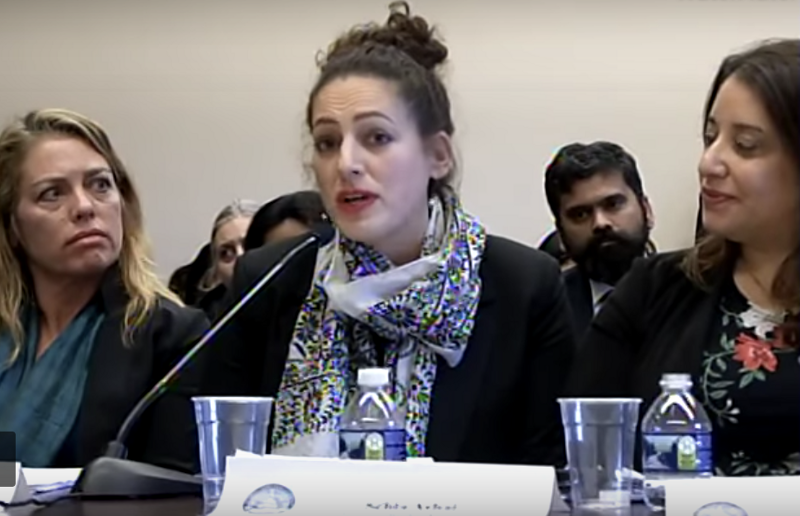
The stench of Hindu nationalism at work in Indian-occupied Kashmir cannot be contained or ignored — and neither can the defiant voices of an internally colonized population in Kashmir demanding self-determination. This was the message from the US Congressional hearing on Kashmir that took place last week.
On November 14, a historic US congressional hearing entitled “Jammu & Kashmir in Context” grappled with the pivotal dynamics of repression and resilience.
Its witnesses condemned the ever-increasing authoritarianism of Prime Minister Narendra Modi’s India, centered the experiences of Kashmiri Muslims to an unprecedented degree, advocated for the restoration of fundamental human rights to the people of Kashmir, and advanced the right to self-determination as a permanent solution to the conflict.
Hosted by the Tom Lantos Commission on Human Rights — which is chaired by Representatives Jim McGovern (D-MA) and Chris Smith (R-NJ) — and attended by Representatives David Cicilline (D-RI), Sheila Jackson Lee (D-TX), David Trone (D-MD), Pramila Jayapal (D-WA) and Brian Fitzpatrick (R-PA), the hearing delved deeper into ongoing human rights crisis in Kashmir that were covered by the October 22 Asia Subcommittee Hearing.
On August 5, the Indian Parliament — under the control and direction of Modi’s Hindu nationalist Bharatiya Janata Party (BJP) — abrogated Articles 370 and 35A of the Indian Constitution, which had guaranteed some measure of political and economic autonomy to Kashmiris.
Since then, Jammu & Kashmir’s statehood has been revoked, with the primarily Muslim population of the newly bifurcated union territory enduring brutal extralegal pellet injuries and killings, nighttime abductions and arrests, a near-total communication blackout, and a disastrous economic blockade.
The Personal Is Political: Kashmiris And The Diaspora:
Often spoken at and for — by Indian and Pakistani interlocutors – this human rights hearing refreshingly featured two Kashmiri-American voices, human rights lawyers, Ms.Yousra Fazili and Ms. Sehla Ashai, who historicized and personalized rampant abuses by the Indian government in the 72 years of its occupation of Kashmir.
Ms. Fazili recounted firsthand the story of her cousin, 63 year old Kashmiri businessman Mubeen Shah, who along with thousands of other ordinary Kashmiris have been detained extrajudicially in Indian jails hundreds of miles outside of Kashmir, without charge or recourse, as reported extensively by the New York Times. Mr. Shah, a successful merchant, was dragged from his home under the cover of night and has been denied access to critical care necessary to treat his numerous life-threatening health issues. Commenting on the plight of those less privileged than her cousin, Ms. Fazili brought attention to the grim plight of a sick, young Kashmiri man among those suddenly seized, “Faisal, a 25 year old who suffered seizures and has bipolar disorder, has been arrested and tortured several times since 2016 under the Public Safety Act (PSA). When he was rounded up on August 5, he was out buying medicine for his mother. Now, he is far away in jail in Uttar Pradesh.”
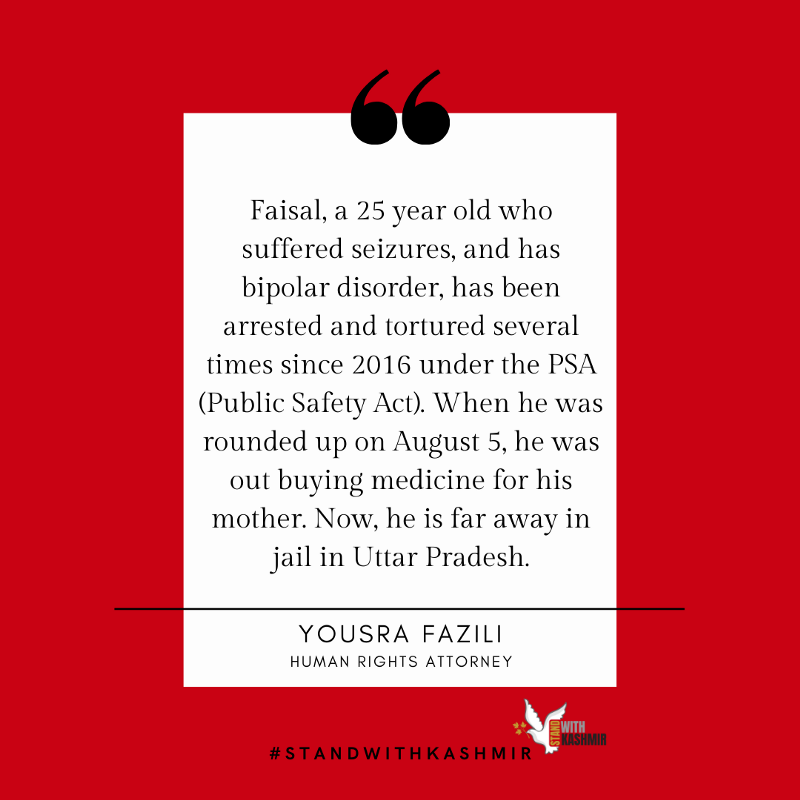
Ms.Ashai, encapsulated the perils of Kashmiris exercising democratic rights to freedom of speech and assembly by painfully noting her family’s history, “in the three generations before me, several of my relatives have either been jailed, tortured, or killed for the same truths that I am here to say to you today. So speaking openly to you about the plight of Kashmir without fearing for my life, is not a privilege that I take lightly.”
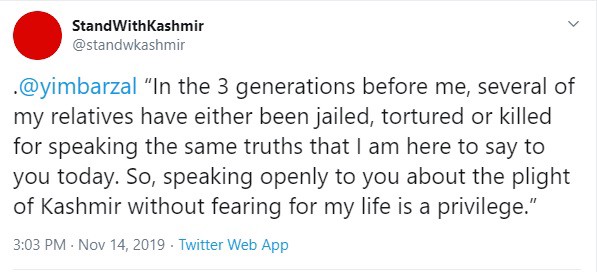
Solving Kashmir: A Local Problem with a Global Solution
As the laundry list of human rights abuses committed by the Indian government grows longer, calls for the unrestricted entry of international media, independent observers and U.S./E.U. elected officials rise to a crescendo as Kashmir begins to take centre-stage in the global consciousness.
India’s blatant disregard of internationally established norms of human rights law since and prior to August 5 prompted Mr. John Sifton, Asia Advocacy Director for Human Rights Watch, to address the communications blockade by stating unequivocally, “when you do a kill-switch approach where you shut off mobile data, even if you leave the phones on, if you cut off the internet, in that way, you are violating international human rights law”.
While Ms. Sunanda Vasisht spoke to the suffering of her community of Kashmiri Pandits (Hindus) due to the conflict in decades past, witness Ms. Haley Duschinski, an associate professor of anthropology excoriated the government of India for never having fully investigated the cause of their mass exodus and crimes committed against them. In recommending the immediate establishment of international investigative commissions, Ms. Duschinski went on to caution pointedly, “that the pain and suffering of any Kashmiri community should not be instrumentalized, manipulated, or weaponized as a claim against other communities.” Indeed, Stand With Kashmir (SWK) welcomes such restorative measures as a first step towards solving the Kashmir dispute with an eye towards fairness and justice for all its people.

Speaking as experts on international law and human rights, the witnesses repeatedly cited the primacy of and need for recourse to international procedures. Ms. Ashai expressed her support for the United Nations’ Office of the High Commissioner on Human Rights’ (OHCHR) recommendations, in 2018 and 2019, given the concrete and actionable steps outlined in the reports, designed to get to the truth of the situation in Kashmir. In keeping with her earlier prescriptions, Ms. Duschinski asked the U.S. to urgently take notice of the humanitarian crisis while noting that, “the international resolution of the Kashmir dispute requires justice, truth, and a democratic and peaceful solution in keeping with international law for all Kashmiris”.
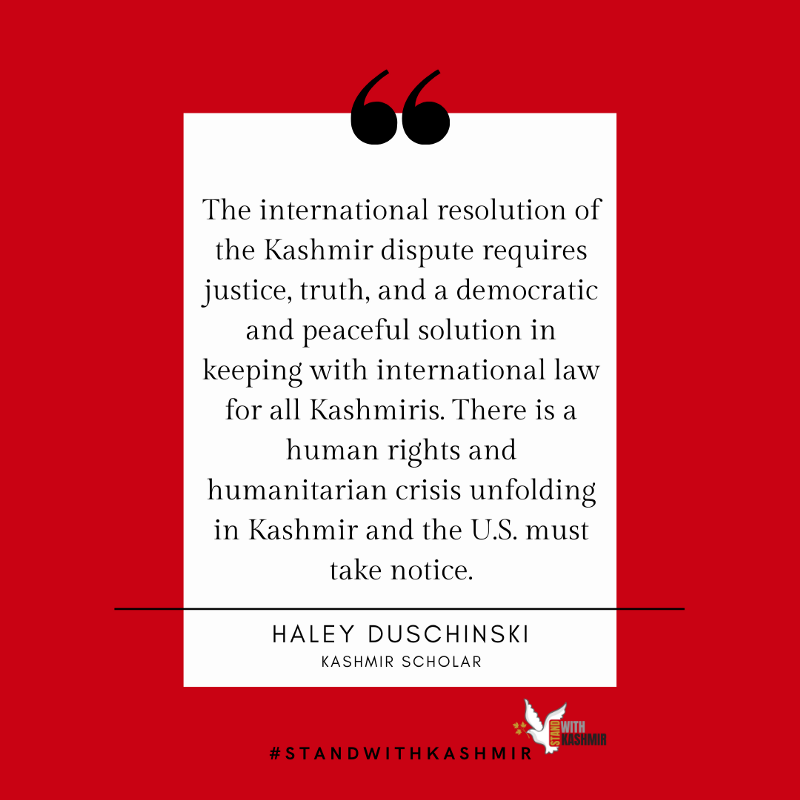
Speaking to the particular role that the U.S. could take despite its withdrawal from the Human Rights Council (HRC), Mr. Sifton suggested that Congress could call for measures such as the set up of commissions of inquiry, a special rapporteur or even a procedure such as special UN fact-finding mission to Kashmir, by lobbying governments of countries on the HRC to vote for such actions.
Veering Right: Hindutva Politics, Islamophobia and the Pakistan Strawman
A number of witnesses testified that the Kashmir crisis epitomizes the Hindu ethnonationalist authoritarianism currently plaguing India as a whole. Commissioner Anurima Bhargava of the US Commission on International Religious Freedom (USCIRF) highlighted India and Kashmir’s long-standing traditions of religious plurality and co-existence, noting that stories of the “many Hindus who are taking care of mosques [and] Muslims who are taking care of temples” are deliberately sidelined.
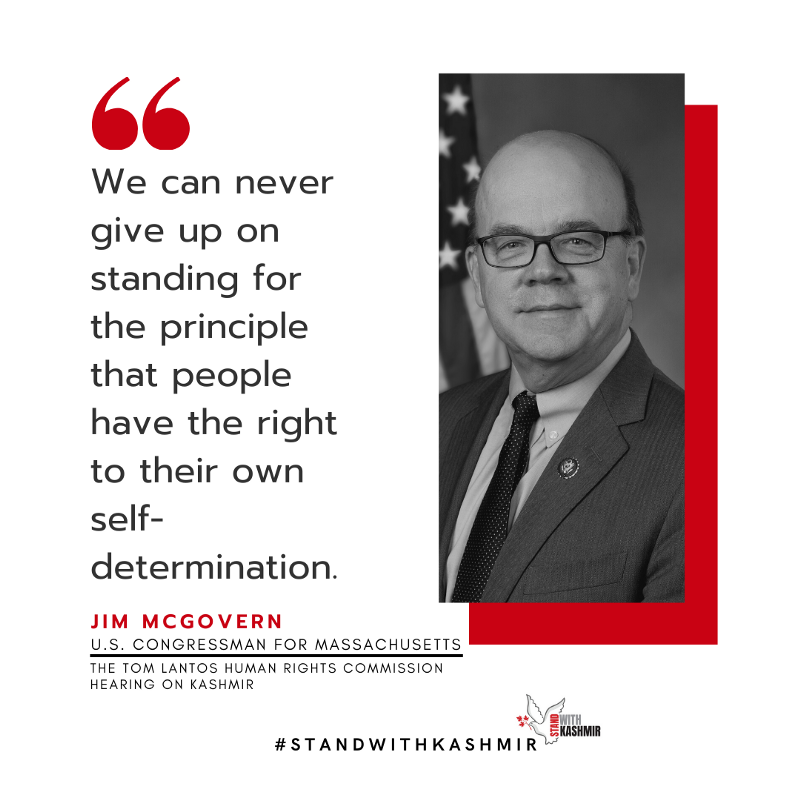
Ms. Bhargava further decried the Modi regime’s figureheads and functionaries for contravening these traditions and bringing India’s religious minorities to a “precipice,” warning that, “if the Indian government continues on its current trajectory, their livelihood, rights, and freedoms could be in serious danger.” Disappointingly however, Ms. Bhargava kept reiterating that there was no way to verify claims of denial of religious freedom in Kashmir when there have been a series of fact-finding missions by independent groups of Indian citizens (including a women’s rights group from Aug. 9–13, a group reporting from Oct. 5–9, and a coalition of concerned citizens from different professional backgrounds who travelled to Kashmir between September 25–30 and Jammu between October 6 &7) _
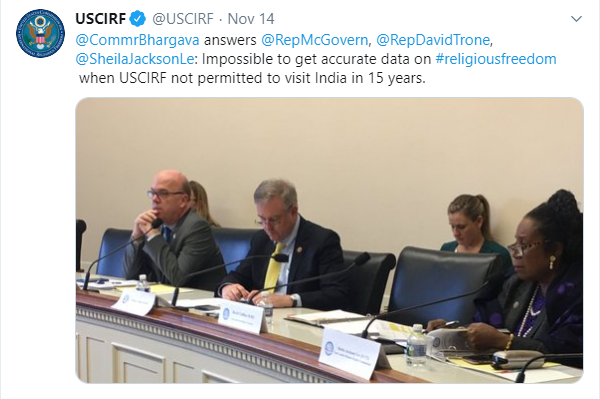
Mr. Sethi echoed Ms. Bhargava’s testimony in asserting that, for all its claims of being the world’s largest democracy, India today “more closely resembles an authoritarian regime than a pluralistic republic” as a direct result of the Hindu Right’s efforts to refashion the country into a Hindu nation. Connecting the “mass suspension of rights” in Kashmir to the National Register of Citizens implemented by the northeastern state of Assam — due to which almost two million people of Bengali origin fear losing their citizenship — Sethi insisted that democracies “only work if people can speak associate and protest freely” and “only thrive if they safeguard civil liberties and minority rights.”
 In addition, Ms. Ashai and Mr. Sifton challenged the Hindu Right’s flagrant utilization of Pakistan as a strawman to justify domestic repression. Ms. Ashai adapted journalist Carl Sandburg’s famous quip to summarize the Modi regime’s regional geopolitical machinations: “If the facts are against, argue the law. If the law is against you, argue the facts. If the law and the facts are against you, just pound the table and yell about Pakistan.” Mr. Sifton argued that India has blamed Pakistan for the Kashmir crisis to avoid reckoning with its own abuses in the occupied territory, which have greatly exacerbated the security concerns it foregrounds. He notified the Government of India that it can no longer “wiggle its way” into Congress and effectively lobby against all issues raised about its conduct.
In addition, Ms. Ashai and Mr. Sifton challenged the Hindu Right’s flagrant utilization of Pakistan as a strawman to justify domestic repression. Ms. Ashai adapted journalist Carl Sandburg’s famous quip to summarize the Modi regime’s regional geopolitical machinations: “If the facts are against, argue the law. If the law is against you, argue the facts. If the law and the facts are against you, just pound the table and yell about Pakistan.” Mr. Sifton argued that India has blamed Pakistan for the Kashmir crisis to avoid reckoning with its own abuses in the occupied territory, which have greatly exacerbated the security concerns it foregrounds. He notified the Government of India that it can no longer “wiggle its way” into Congress and effectively lobby against all issues raised about its conduct.
 The culmination of the November 14 Lantos Commission Hearings and the October 22 Asia Subcommittee Hearings on the abysmal state of human rights in Kashmir lead to the undeniable realization that for there to be everlasting peace in Kashmir and the Indian subcontinent by extension, the Kashmiri people will have to be granted their right to self determination.
The culmination of the November 14 Lantos Commission Hearings and the October 22 Asia Subcommittee Hearings on the abysmal state of human rights in Kashmir lead to the undeniable realization that for there to be everlasting peace in Kashmir and the Indian subcontinent by extension, the Kashmiri people will have to be granted their right to self determination.
This sentiment was aptly encapsulated by Lantos Commission Chair, Rep. McGovern who unequivocally stated, in response to Ms. Vashist’s snide remarks that there would never be a plebiscite or referendum in Kashmir due to Pakistan and China that “we can never give up on standing for the principle that people have the right to their own self-determination.”
©2025 StandWithKashmir All rights reserved. SWK is a 501(c)(3) non-for-profit organization.


Leave a Reply